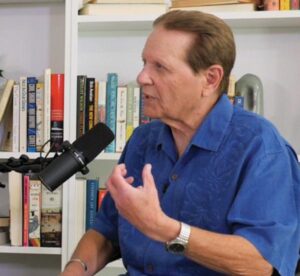Charles Darwin’s Theory of Evolution was, undeniably, one of the most profound scientific advances in human history. His discovery of Natural Selection changed everything. It was a turning point in our understanding of who we are, where we come from, and how we got there. It’s impact on science and society cannot be overstated.
But a key hypothesis of Darwin’s about how evolution takes place, the mechanism for biological evolution, was flat-out wrong. His theory, “Pangenesis,” was that variation in individuals was caused by what he called “gemmules” that mixed with one another in the fertilized egg. Genes had not yet been discovered, let alone their critical role as drivers of evolutionary change. Years later it was proven, by further experimentation and research, that Darwin’s gemmules simply did not exist.
I’m not a scientist, but as I understand it, that’s how science works. Every major advance includes within it elements that are incorrect, and it takes further research and application of that advance to correct them. Not only that, but every scientific advance is itself preceded by failure after failure. That’s also how science works.
And that brings me to Bob Avakian. I came across his writing when I was on the staff of the Oleo Strut, the GI antiwar coffeehouse in Killeen, Texas, next to Ft. Hood. This was 1970, when revolutionary upheaval was sweeping the planet. GIs from all walks of life, just back from Vietnam, were reading Malcolm X and Mao Zedong. Organizations were forming and growing around every trend, from Marxism to the revolutionary nationalism of Patrice Lumumba. We knew that capitalism and its most ugly manifestation—imperialism—needed to be swept from the planet. And we were hungry. I gobbled up the Red Papers, a series of in-depth pamphlets that Bob and the Revolutionary Union were producing, and I, along with the literally thousands of revolutionary minded youth of that time, dove right in.
Well, things didn’t pan out as so many of us worked for and expected. The movements we came out of largely disappeared, and the revolutionary wave of the sixties became the famously dubbed “Me Decade” of the seventies. Worst of all, for those of us who dedicated our lives to revolution—even in this biggest of all imperialist countries—and the goal of communism as Mao and the millions of revolutionaries in China were forging, came the crushing blow to Mao’s allies after his death and the rapid reinstatement of capitalism in China along with the slanderous attacks on all that had been accomplished in those three unprecedented decades under Mao’s leadership.
I, along with a lot of others, became disoriented and disheartened, as memories of revolution were driven off the stage. It’s not like nothing was happening, but the beacon of China was no longer there, and the road forward became murky and filled with boulders. Think about it—the two great communist revolutions of the twentieth century, Russia and China, had both turned into their opposites: Russia long ago becoming yet another imperialist power oppressing nations and challenging the U.S. for world domination, and China just a few years after Mao’s death once again a playground for capitalists the world over pursuing cheap labor and eventually yet another imperialist contender. How could you NOT become disoriented and disheartened?
And how could you not conclude, as so many did, that our revolutionary fervor of the sixties was really just youthful idealism, that a revolution would actually make things worse, and the only “realistic” road was to “work within the system” for reforms here and there? How could you not take that road?
The only way you couldn’t was to dig deeper than ever before into the science of Marxism, and that’s exactly what Bob Avakian did. Just as the evolutionary scientists who followed Darwin had done, he explored the unprecedented experiments of the Russian and Chinese revolutions, revolutions that for relatively brief periods freed over a third of humanity but were undermined not just by outside forces (both revolutions were viciously assaulted by imperialist powers led by the U.S.), but by internal weaknesses and outright wrong, even disastrous formulations that continued to plague Marxist thinking and had devastating effects. He dug deep, with a total openness to question everything, and over a period of decades developed a “New Communism,” one aimed at rooting out the errors of the past and forging a new incredibly bright possible future for the planet.
He really did that. And it’s out there for anyone to see for themselves, question, argue, and decide what they intend to do. When I read the new draft Constitution for the New Socialist Republic in North America for the first time years ago, I was floored and exhilarated. No death penalty. No “The ends justify the means.” A society of vigorous debate and contention of the road forward, a society any thinking, feeling person would long to be a part of.
I’m still disoriented and disheartened. We live in times that are more complicated and terrifying than any in my lifetime, and—yes—the possibility of revolution seems so very remote. But I know, when I look back at my own experience, that things can and do, under the right circumstances, turn on a dime. And I love—yes, love—Bob Avakian and what he has created for humanity and the possibility of forging a whole new world.
David Zeiger
Filmmaker
Director of Sir! No Sir!



